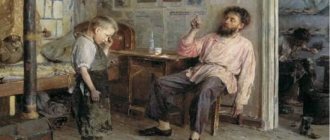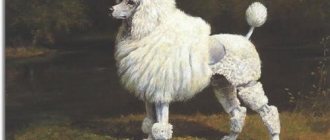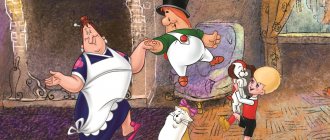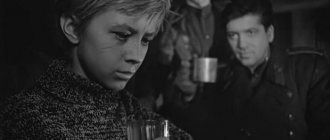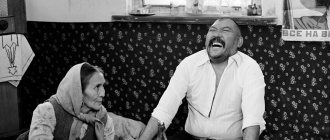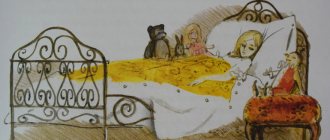About the product
Kuprin wrote the story “The White Poodle” in 1903. In the work, the author touched on themes of care, selfless friendship, and social inequality. The conflict of the story is based on the contrast between how wandering artists and rich people treat a trained dog. The old man and the boy perceive Artaud as a close friend, while for the lady’s son this is just a toy, which he will probably forget about tomorrow.
On our website you can read online a summary of “The White Poodle” without prior registration when preparing for a literature lesson or filling out a reading diary.
The material was prepared jointly with a teacher of the highest category, Kuchmina Nadezhda Vladimirovna.
Experience as a teacher of Russian language and literature - 27 years.
History of the story
A.I. Kuprin loved Crimea very much, and almost every year he went there with his family. When they were vacationing in Miskhor, traveling artists often came to their dacha. One day an interesting company appeared: a grandfather with a barrel organ on his shoulders, a teenager Seryozha and a trained poodle. As soon as the sound of a barrel organ was heard, spectators came running from neighboring dachas: hired builders, small children with nannies and parents.
After the concert, the old man received the money they had earned, and Alexander Ivanovich called the troupe to the table. They usually refused to sit down with everyone else and went with their bowls to the shore and ate there under the trees. The writer tried to talk with the musicians, but the old man was not very talkative, but the boy willingly shared his impressions of what he saw. He told Kuprin how once he was invited to a real circus, where acrobats performed. Since then, he fell in love with the circus and also dreamed of becoming an acrobat.
He also told a story about a rich lady who insistently demanded that he sell her a dog for her son. But they could not part with their friend and quickly left that city so that, God forbid, they would not be accused of theft or something else. It was this version, based on real events, that served as the plot on which Kuprin wrote his story “The White Poodle” in 1903, revealing two important themes in it: social injustice and love for animals.
Other characters
- Trilly is the son of the owners of the Druzhba dacha, a capricious boy of eight to ten years old.
- The lady is the owner of the “Friendship” dacha.
- Janitor - served with Trilly's parents.
And we also have:
for the most impatient -
A very brief summary of “White Poodle”
for the most sociable -
The main characters of "White Poodle"
for the busiest -
Reader's diary "White Poodle"
for the coolest -
Read "White Poodle" in full
The role of contrast in the depiction of heroes
An analysis of Kuprin’s story “The White Poodle” can be completely built on contrast , the juxtaposition of sharply expressed character traits, qualities and personality traits, and even pictures of nature. At the center of the story is a conflict between a rich lady and a troupe of traveling artists. For the first, the Artaud poodle is simply a thing that can be bought. For Lodyzhkin and Sergei, this is a friend, for the sake of whose salvation the boy is ready to risk his life.
The work is divided into 6 chapters, each of which carries its own meaning. For ease of analysis, you can name them together with your children. These headings will be the outline for writing in the reader's diary:
- Meet the heroes.
- In search of income.
- Performance of the artists and the whim of Trilly.
- Offer to sell a poodle and refusal.
- Theft of Artaud.
- Saving a friend.
The poodle kidnapping scene divides the story into two parts. In the first, the characters are looking forward to earning money, they understand and love each other. The second part is filled with fear, anxiety and hopelessness: “Sergei thought sadly,” “his thoughts became more hopeless,” “submitting to one feeling of fear.” When creating a landscape, the author uses the contrast of light and shadow, color sketches. As they walk along the road past the cottages, they describe a sunny day, bright green grass, the blue color of the sea, blooming magnolias, etc.
On the page describing the boy’s nighttime penetration into the dacha, the author uses gloomy colors: “black silhouette”, “dark bushes”, blue forest in the distance, etc. A. I. Kuprin contrasts the 2 worlds not only in terms of social status, but also in terms of moral content . For example, a lady, indulging the whims of her child, does not think at all about the feelings of other people when she asks to sell the Artoshka (and then orders it to be stolen).
Poor old Lodyzhkin even treats the barrel organ as if it were a living creature: “he stroked it on its carved side and whispered affectionately.” And if the son of Lady Trilly is gentle and clumsy in his actions, then Kuprin describes Seryozha not only as dexterous and strong, but as smart and sensible, able to see the beauty of nature: “he expressed his delight out loud, every minute tugging at the old man’s sleeve.” He highly values what he has: “Let me clean you of the dust, you’re completely limp, grandpa.”
Summary
Chapter 1
“A small traveling troupe was making its way along the southern coast of Crimea.” The poodle Artaud ran ahead, Sergei walked behind him, and grandfather Martyn Lodyzhkin trudged behind “with a barrel organ on his crooked back.” The barrel organ barely worked, and only the long-obsolete waltz and gallop could be played on it.
Chapter 2
The troupe went to the old count's park, “in the dense greenery of which beautiful dachas were scattered.” Sergei and Martyn began walking around the dachas, but “it turned out to be a bad day for them.”
Almost everywhere they were turned away or refused; they paid only in two. And although Lodyzhkin was glad to have at least some income, he was greatly outraged by one lady: the woman watched the performance for a long time and questioned them, and then gave them only a ten-kopeck piece of paper.
They walked around the entire dacha village. There was one last dacha left behind a high fence, on which was written “Dacha Druzhba”.
Chapter 3
The troupe entered the garden, and Seryozha laid out a rug in front of the balcony. Just as they were about to start the performance, a boy ran out onto the terrace, making shrill sounds. The servants, a young lady and a fat bald gentleman hurried after him. They tried in every possible way to calm the child, but he did not let up.
Lodyzhkin said to begin the performance. Hearing the sounds of the barrel organ, “everyone on the balcony perked up at once.” They wanted to drive the artists away, but Trilli began to act up so that they would be returned. Lodyzhkin played the barrel organ, Sergei performed acrobatic stunts. After this, Martin took out a thin whip, and Artaud obediently followed his orders.
Seeing the trained dog, Trilly immediately demanded the poodle for himself. The lady asked how much Lodyzhkin wanted for Artaud. Martyn replied that the poodle is not for sale, because he feeds them. The boy screamed even louder. The angry lady was ready to pay whatever she wanted, but Lodyzhkin did not yield. Then the janitor drove the artists out of the dacha.
Chapter 4
Already at the sea, the janitor caught up with the artists. Feeding the poodle sausage, he explained that he had come on behalf of a lady who was offering 300 rubles for the dog. The old man resolutely refused to sell Artaud.
Chapter 5
Lodyzhkin and Seryozha stopped for breakfast in the “corner between Miskhor and Alupka” near the spring. After breakfast they decided to get some sleep. Half asleep, grandfather talked to himself: discussing how he would buy a pink leotard with gold and pink satin shoes.
While Sergei and Martyn were sleeping, Artaud disappeared. Seeing a piece of sausage lying on the road, the old man realized that the janitor had taken the dog. Martin was very upset.
The indignant Sergei said that he would come back now and force him to give up the dog, otherwise he would have to turn to the peace officer. Lodyzhkin replied that they could not appeal to the peace officer: he lives on someone else’s passport, and in fact is a peasant Ivan Dudkin.
Chapter 6
“Silently they walked to Alupka” and stopped in a dirty Turkish coffee shop called “Yldyz” - “Star”. Late at night, Sergei quietly got ready and left. The boy went to the Druzhba dacha. Having climbed through the patterned cast-iron gate, he decided to go around the dacha.
From the stone basement, Sergei heard a groaning squeal. The boy called the dog and “a frantic, intermittent barking immediately filled the entire garden.” A bass scream was heard in the basement and something banged. The indignant Sergei shouted that they should not dare to hit the dog.
The janitor and Artaud ran out of the basement with a piece of rope around their neck. Seryozha, followed by the poodle, ran away. Having found a place where the fence wall was low enough, the boy picked up the dog, jumped in himself, and they quickly ran away.
Although the janitor did not pursue them anymore, the dog and the boy ran for a long time. After resting at the source, Sergei and Artaud returned to the coffee shop. Artaud, in joy, ran up to Lodyzhkin with a squeal and woke him up. The old man wanted to turn to the boy for an explanation, but he had already fallen asleep.
Read the summary of Kuprin White Poodle chapter by chapter
The plot of the work “Snow White Poodle” by A. I. Kuprin is based on real events. The author had a dacha in Crimea and there, nomadic artists often came to visit. So one day one of the guests, a little guy, told a story that happened to a dog. This became the basis for writing the story.
Chapter 1
A small nomadic troupe was walking along the southern coast of Crimea. The white poodle Artaud ran ahead, followed by the boy Seryozha, he was 12 years old. The boy had a cage in one hand and a rolled-up carpet in the other. The last to go was the head of the troupe, Martyn Lodyzhkin. On his back was a barrel organ, a very old one. Sergei was in the troupe from the age of 7, he was taken from his drinking father and promised to pay him a couple of rubles a month. After a while, the boy's father died, and he stayed with his grandfather. The troupe traveled from one village to another.
Chapter 2
It was summer time. Despite the sultry heat, the artists still walked. Seryozha was very inquisitive; he looked at plants, flowers and buildings with interest. Martin told the boy that this is only a small part of the world that the boy will see, because big cities await them ahead. One of the summer days turned out to be very bad, people drove them away and practically did not pay. They met one woman who completely tossed a coin that didn’t mean anything. So the troupe moved day after day, and soon they came to the Druzhba dacha.
Chapter 3
The road to the house was paved with gravel. The artists began to prepare for the performance, when suddenly a boy in a sailor suit, who looked to be about 10 years old, jumped out of the house, and six more adults ran out after the boy. This child screamed and cried a lot, and even fell to the ground. Adults ran around him and asked him to take medicine. At first, the troupe followed the course of events until Martyn ordered it to begin. The sound of the barrel organ began to flow, this calmed everyone around, and even the restless child calmed down. At first, the artists were treated negatively; they were even inclined to leave. But the boy began to ask to be called. The artists returned and continued their performance. Having finished, Artaud, according to tradition, approached the lady, with a cap in his teeth. The boy, seeing the dog, began to cry and shout that he wanted it to be given to him. The old man refused to give up the dog, and the artists were driven away. The artists followed to the seashore to take a break, relax and swim. Soon a janitor approached them.
Chapter 4
The young lady sent the janitor to pick up the dog. But Martin never agreed to this. The janitor said that the boy’s father holds a responsible position; he is engaged in the construction of roads throughout the country. It followed from this that the family was very rich and therefore accustomed to pampering their only child and not denying him anything. But even such conversations could not convince Martyn, and soon the troupe left.
Chapter 5
They walked all the way to a mountain stream, where they stopped to have a snack and rest. After dinner, everyone fell asleep, but through his sleep it seemed to Martyn that he heard a poodle growling, but he could not go and look, so he continued to sleep. Sergei woke up first and was the first to discover the dog was missing. Martin found footprints nearby. It was clear that it was the janitor who stole the dog. It was impossible to ask anyone for help, since my grandfather didn’t even have a passport. The only chance to find the dog was when the troupe was returning past Friendship, but they never saw Artaud.
Chapter 6
The artists reached Alupka, where they stopped to spend the night in Ibrahim’s coffee shop. That night Seryozha could not sleep and decided to return to that dacha. He entered the territory of the dacha and saw Artaud tied up, who was also locked in the basement. Artaud immediately recognized the owner and began to bark. A janitor came running to his barking and began to beat the dog, and then the boy could not stand it and screamed. The janitor rushed to catch the boy and left the basement open. At this time, the dog broke free and ran out into the street. Seryozha and Artaud jumped over the fence and ran away. The janitor no longer began to chase after them.
Rate this piece:
- 3.94
Votes: 251
Read summary White Poodle. Brief retelling. For a reader's diary, take 5-6 sentences
